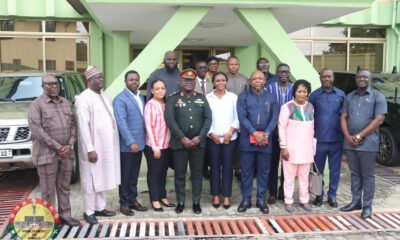News
Ghana pledges to explore Gene Drive Technology as a strategy to combat malaria – Minister

Given the high burden of malaria in Africa, particularly in Sub-Saharan Africa, research scientists from the region are collaborating with global counterparts to explore genetic solutions to combat malaria transmission both locally and globally.
Ghana has expressed interest in exploring gene drive technology, a genetic engineering technique that alters genes to defy the typical rules of inheritance.
This technology significantly increases the chances that specific genes will be passed on to the next generation, enabling these genes to spread rapidly through a population and potentially override natural selection.
This interest was revealed at the Second Global Genetic Biocontrol Congress in Accra in partnership with the National Biosafety Authority, Ghana.
It brought together scientists, researchers, and stakeholders from 24 institutions across 15 countries and was held under the theme: “Harnessing Genetic Biocontrol Potential Solutions in Changing Climate.”
In a statement, Dr. Ibrahim Murtala Muhammed, Ghana’s Minister of Environment, Science, and Technology, emphasized malaria as a “serious threat” and underscored its significant economic impact on Africa, where millions are spent annually on malaria control.
He reassured that Ghana is committed to adopting emerging technologies to support disease prevention, including those affecting crops, as long as they do not pose a risk to human survival.
“Opposition to GMOs often stems from cultural and social concerns. However, the critical question is whether we should move forward with such technologies,” Dr. Muhammed stated.
He added “As long as they do not endanger our survival or cause adverse health effects, we are not opposed to them.”
Gene drive technology offers a promising new strategy to combat malaria by creating a “vaccine” for mosquitoes that prevents them from transmitting the disease.
Scientists genetically modify mosquitoes to make them incapable of spreading malaria, and these modified mosquitoes are then released into the wild, where they breed with others.
Over time, the genetic modification spreads through the population, and more mosquitoes become incapable of transmitting the disease.
Professor Fredros Okumu, a Public Health Researcher and Mosquito Biologist, emphasized the need for innovative, high-success solutions to fight malaria in Africa.
He pointed out that current malaria vaccines, which require multiple doses, highlight the necessity for more effective tools. “We need new tools,” he said, “and gene drive technology could be the solution.”
Dr. Willy Tonui, Founder and Executive Director of the African Genetic Biocontrol Consortium, explained that the Congress served as a platform for collaboration among researchers, developers, and practitioners. He stressed that the event would foster cooperation and drive new scientific advancements, particularly with technologies like gene drive and Wolbachia-induced cytoplasmic incompatibility.
Dr. Misheck Mulumba, the Congress President, advocated for the One Health approach to disease control, arguing that it offers a more affordable and efficient strategy for addressing health challenges.
By Benedicta Gyimaah Folley
Hot!
Speaker of Parliament inaugurates open Parliament Steering Committee, launches action plan

The Speaker of Parliament, Alban Sumana Kingsford Bagbin, has launched the Open Parliament Steering Committee and the Open Parliament Action Plan.
The ceremony was under the theme “Achieving Gender Equality: Action by Action.”
The Speaker highlighted the critical role Parliament plays in translating the will of the people into inclusive legislation, responsive policies, and accountable governance.
“The International Day of Parliamentarianism is worth celebrating, as it offers an opportunity not only to recognise and promote achievements in strengthening democratic governance, but also to pause and reflect on the remaining gaps in institutionalising parliamentary democracy,” he said.
He noted that the event was scheduled to coincide with the International Day of Parliamentarianism to reinforce the importance of open and inclusive governance.
The Majority Leader, Mahama Ayariga, stated that the International Day of Parliamentarianism is intended to recognise the vital role Parliaments play globally as pillars of democratic governance.
He noted that this marks the first time Ghana is formally observing the day.
“The gravity of our observance is further accentuated as we convene to witness the launch of the Open Parliament Action Plan by the Open Government Partnership Caucus,” he said.
Delivering a statement on behalf of the Minority Leader, Alexander Kwamena Afenyo-Markin, the Deputy Minority Leader, Patricia Appiagyei, described the Open Parliament Action Plan as a transformative initiative aimed at strengthening the relationship between Parliament and the public.
She said the plan represents a bold commitment to making Parliament more transparent, accessible, and responsive to the needs of Ghanaians.
The Clerk to Parliament, Mr. Ebenezer Ahumah Djietror, described the launch as a key milestone in the effort to build a citizen-focused and accountable Parliament.
He added that the International Day of Parliamentarianism is a call to action to recommit to the highest standards of public service and democratic accountability.
The inauguration was attended by a wide range of stakeholders, including the Majority and Minority Members of Parliament, members of the Open Parliament Steering Committee, the Open Government Partnership (OGP) Caucus, Parliamentary Network Africa, representatives from civil society organisations, members of the diplomatic corps, traditional and religious leaders, student bodies, the Parliamentary Press Corps, and other media partners.
Hot!
NACOC declares drug menace a national emergency

The Parliamentary Committee on Defence and Interior has paid a working visit to the Narcotics Control Commission (NACOC) to engage with its leadership and assess operational challenges hampering the fight against illicit drugs.
In a detailed presentation, Dr. Basha Ligbi, Head of the Commission’s Research Bureau, highlighted critical setbacks including broken body scanners at airport terminals, inadequate office infrastructure, overcrowded detention facilities, and deteriorating vehicles.
He also called for the Commission’s headquarters to be reclassified as a security zone, citing growing security risks due to private encroachment and nearby high-rise developments.
Director General of NACOC, Brigadier General Maxwell Obiba Mantey, described the escalating drug trade as a national emergency, warning that drug barons now rival armed robbers in threat level and are gaining influence at the highest levels.
He appealed for stronger institutional support and morale-boosting interventions to preserve the integrity of NACOC officers.
Chairman of the Committee and MP for Builsa North, James Agalga, assured the Commission of the Committee’s commitment to escalate the concerns to Parliament and engage key justice sector stakeholders to fast-track reforms in support of NACOC’s mandate.














